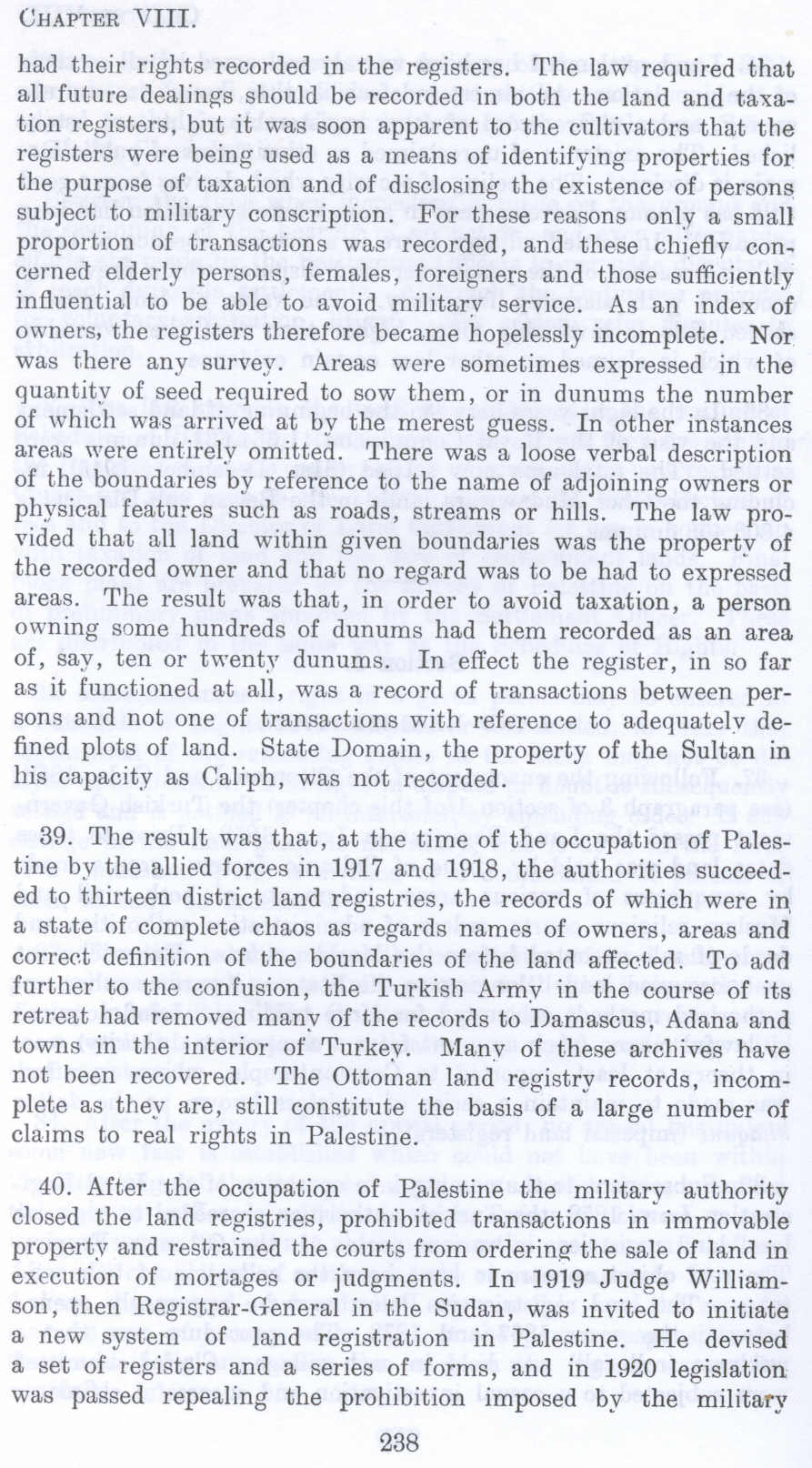| Prev | Next |  |
| Prev | Next |
| PalestineRemembered | About Us | Oral History | العربية | |
| Pictures | Zionist FAQs | Haavara | Maps | |
| Search |
| Camps |
| Districts |
| Acre |
| Baysan |
| Beersheba |
| Bethlehem |
| Gaza |
| Haifa |
| Hebron |
| Jaffa |
| Jericho |
| Jerusalem |
| Jinin |
| Nablus |
| Nazareth |
| Ramallah |
| al-Ramla |
| Safad |
| Tiberias |
| Tulkarm |
| Donate |
| Contact |
| Profile |
| Videos |
British Mandate: A Survey of Palestine: Volume I - Page 238 |
Disclaimer
The above documents, article, interviews, movies, podcasts, or stories reflects solely the research and opinions of its authors. PalestineRemembered.com makes its best effort to validate its contents.


Post Your Comment
*It should be NOTED that your email address won't be shared, and all communications between members will be routed via the website's mail server.
had their rights recorded in the registers. The law required that all future dealings should be recorded in both the land and taxation registers, but it was soon apparent to the cultivators that the registers were being used as a means of identifying properties for the purpose of taxation and of disclosing the existence of persons subject to military conscription. For these reasons only a small proportion of transactions was recorded, and these chiefly concerned elderly persons, females, foreigners and those sufficiently influential to be able to avoid military service. As an index of owners, the registers therefore became hopelessly incomplete. Nor was there any survey. Areas were sometimes expressed in the quantity of seed required to sow them, or in dunums the number of which was arrived at by the merest guess. In other instances areas were entirelv omitted. There was a loose verbal description of the boundaries by reference to the name of adjoining owners or physical features such as roads, streams or hills. The law provided that all land within given boundaries was the property of the recorded owner and that no regard was to be bad to expressed areas. The result was that, in order to avoid taxation, a person owning some hundreds of dunums had them recorded as an area of, say, ten or twenty dun urns. In effect the register, in so far as it functioned at all, was a record of transactions between persons and not one of transactions with reference to adequately defined plots of land. State Domain, the property of the Sultan in his capacity as Caliph, was not recorded.
39. The result was that, at the time of the occupation of Palestine b v the allied forces in 1917 and 1018, the authorities succeeded to thirteen district land registries, the records of which were in a state of complete chaos as regards names of owners, areas and correct definition of the boundaries of the land affected. To add further to the confusion, the Turkish Army in the course of its retreat had removed many of the records to Damascus, Adana and towns in the interior of Turkey. Many of these archives have not been recovered. The Ottomaan land registry records, incomplete as they are, still constitute the basis of a large number of claims to real rights in Palestine.
40. After the occupation of Palestine the military authority closed the land registries, prohibited transactions in immovable property and restrained the courts from orderina the sale of land in execution of mortages or judgments. In 1919 Judge Williamson, then Registrar-General in the Sudan, was invited to initiate a new system of land registration in Palestine. He devised a set of registers and a series of forms, and in 1920 legislation was passed repealing the prohibition imposed by the military
Page 238